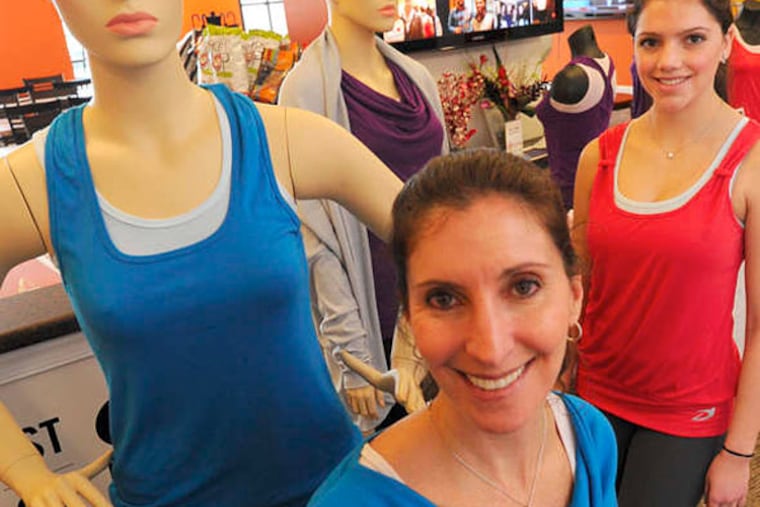Mirror, Mirror: Attractive activewear made right here
Sometimes no matter how slim you are, doing the downward dog means a paunchy pooch pops over yoga pants - unless you own a pair of Devigis.

Sometimes no matter how slim you are, doing the downward dog means a paunchy pooch pops over yoga pants - unless you own a pair of Devigis.
The activewear brand, made and manufactured in Philadelphia courtesy of 43-year-old mom Nadine Gelberg, is designed for yogis - or any athletes, really - who like the slimming lululemon look but prefer a more forgiving silhouette.
The racerback tanks have a bit of slouch in the tummy area to camouflage jiggling bellies. Long-sleeve T-shirts are cowl-necked to inconspicuously hide below-the-chin wrinkles and "drape gracefully across the boobs."
Available in blue, plum, and coral, the tops, ranging in price from $28 to $35, have bands at the bottom to stop them from creeping up. The über-fitted undershirts, both sleeveless and long-sleeve, come in pale pinks and smoky grays - perfect shades to layer under the jewel-toned tops.
It is the pants, however, that set Devigi apart, Gelberg said. Along with a zippered pocket in the back, the $89 pants have an inner waistband at the natural waist and an outer one that stops three inches below the belly button. So when a yogi wears the pants and shirt combo, she's completely smoothed out south of the breastbone.
"When you look at the barriers to working out, a lot of it comes down to fashion," said Gelberg, of Chestnut Hill, who spent 10 years as a product development consultant for sports companies before beginning her life in fashion. "Not to mention, when you look good and feel good you add more of a bounce to your step, and that bounce has real performance benefits."
Isn't that the truth?
"I loved the way they looked on a girl who was spinning," said Teresa Pokladowski after purchasing a pair of black Devigi capris one recent Saturday morning. Gelberg has hosted a trunk show at the Sporting Club in the Bellevue every Saturday in February.
You might think those long-sleeve T's would result in hot runs in the summertime, but Devigi pieces are fashioned from bamboo fabric, which is sustainable and temperature-controlling. That means no pools of sweat under arms, along the back, or under cheeks. After a workout, you can throw on a Devigi hoodie or shrug ($95) to pick up the kids, grocery-shop, or meet a friend for drinks.
This evolution of workout-and-wear gear is precisely why the activewear category is growing, explained Marshal Cohen of the NPD Group, a market research firm.
Annual sales of activewear were up 9.4 percent, reaching $14.2 billion in December, from roughly $13 billion a year earlier.
"It gives women a diversified wardrobe with less items," Cohen said. "Women get more bang for their buck, so it's a practical way for them to amp up their wardrobes."
But the fashion-friendliness of today's activewear - namely bold neon shades and pieces made for layering - is really why women are gravitating toward moisture-wicking pieces.
"Workout clothing is very much inspired by the runway," said Jessica Kaplan, active editor at Stylesight.com.
The athletic collections from Stella McCartney for Adidas, Sweaty Betty, and Lucas Hugh are borrowing layered looks from Rick Owens, Alexander Wang, and BCBG. And it's the independent designers who are driving the growth, she said.
"These labels are helping to propel this major made-in-America movement," Kaplan said. " . . . Manufacturing in the States gives designers the chance to be more innovative."
That was definitely the case for Gelberg, who, despite being just a little over 5 feet and a size 2, didn't like the way her "baby stomach" looked in the popular low-rise pants with fold-over waists.
So last summer, she consulted with local fashion entrepreneurs including Susan Feinberg, who owned the Mulberribush in Bensalem, and luxe womenswear designer Kendra Brill, and launched Devigi, a 14-piece collection, in September.
Gelberg orders the bamboo fabric from Los Angeles and has it cut and sewn at a manufacturing facility in the Kensington/Allegheny neighborhood. So far she has invested close to $100,000 in her business, and she expects to turn a profit by summer.
At the moment, Gelberg is trying to refine her distribution formula. She sells pieces in independent gyms, including the Sporting Club and Balance Chestnut Hill, and in smaller sports apparel stores along the East Coast. Devigi - the word means "to compel" in Esperanto, an academic language designed for universal communication that never took off - is also available at www.devigi.com.
Gelberg's goal, she said, is not to become a behemoth of a company, but to continue to make apparel that combines fitness and fashion that will compel people to work out. Using local resources is also her goal, which in turn will create a community of support and connections that make the growing pains of starting a fashion business more bearable.
"I'm committed to manufacturing locally because I need the help," Gelberg said. "There is so much to learn."